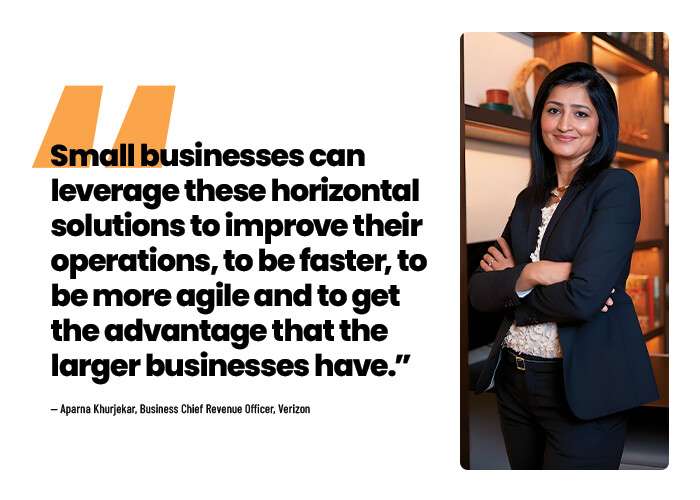Artificial intelligence is beginning to revolutionize how small businesses do everything from customer service to contracting, supply chain management and more. New security solutions are helping organizations be more cyber resilient. And cloud-based Software as a Service tools are empowering them to compete on a new level.
In fact, says Aparna Khurjekar, no segment stands to benefit more from emerging technologies than small businesses. In a wide-ranging conversation with BizTech Managing Editor Bob Keaveney, Verizon’s business chief revenue officer explains why small businesses’ prospects are as bright as ever, and how the right tech can help them thrive.
BIZTECH: For small businesses, AI is a huge issue. How are they responding?
I’m seeing a particular excitement among small businesses. Think about it: The historical competitive advantage of large enterprises has always been their access to specialized talent, whether it’s for creating compelling marketing materials, accessing sophisticated legal advice, or implementing financial models and systems.
Agentic AI, with agents that are now doing entire workflows across various functions, will fundamentally democratize this access. Think about a platform where you’ve got different AI agents performing functions in the legal department, doing sophisticated marketing activities, technical operations, customer service and more.
Click the banner below to keep reading stories from our new publication, BizTech: Small Business.
BIZTECH: Are the opportunities for AI different for small businesses?
KHURJEKAR: Small businesses are going to benefit most from AI because of scale. Small businesses can leverage these horizontal solutions to improve their operations, to be faster, to be more agile and to get the advantage that the larger businesses have.
But the opportunities lie in the same set of constructs. It’s every function being re-imagined. The need for larger enterprises ends up being a lot more bespoke and sophisticated because they have a lot of processes, systems and data that need to be connected. Smaller businesses can take more off-the-shelf solutions and adjust their business models and their data to them. This is where their agility comes into play.
At Verizon, we have to build our own AI solutions. That is work that enterprises are doing, but they’ve got to help themselves. Help can come a lot faster to small businesses, given their size and given the needs that they have.
BIZTECH: You’ve also said that cybersecurity is more urgent now for small businesses. Why?
KHURJEKAR: There are three reasons. No. 1 is they are a lot more digital and they have to work in more hybrid and digital environments. Their employees and customers are distributed. Even if you have a laundromat, you want to have an application that you can use to connect and collaborate. When you have a footprint that is sprawling, that just increases the number of vulnerabilities you have.
No. 2 is that the rogues out there are especially targeting small businesses that haven’t yet thought about things like endpoint security and cloud security. So, they are becoming targets of a lot of cyberattacks.
And No. 3 is that small businesses are more susceptible to going out of business than larger companies. Yes, with enterprise, there is reputation damage, which could be disproportional for them. But smaller businesses don’t have the wherewithal to sustain an attack, and they may be out of business entirely.
BIZTECH: How are small businesses responding?
KHURJEKAR: They’re becoming a lot more aware of what they need to be doing. And they’re a lot more open to investing in the right kinds of solutions. And it’s not one and done: Cybersecurity solutions have to grow as they grow, and their cybersecurity solutions also have to account for every potential place of vulnerability that they have.
BIZTECH: Where are small businesses on the spectrum of cybersecurity maturity?
KHURJEKAR: It depends on the vertical. Several verticals, like financial services, you will see them fairly mature right from the get-go because of the regulatory environment. Others, such as professional services and retailers, we don’t see as much focus, and that is where a lot of education is needed.
Security should be a core principle right from the beginning, so security can grow with you versus coming in after you have become successful. It’s never too late, but it’s always easier to have security as one of your core tenets as you’re building your organization.
BIZTECH: You’re also predicting increased “platformization” with Software as a Service solutions. Can you explain?
KHURJEKAR: What I called out in terms of the AI marketplace is really the disruption that’s starting to be seen in the SaaS story as well. A lot of SaaS solutions — again, with AI embedded in them — are being leveraged today to bring in new customers and support customers on the front, middle and back end.
The more AI takes over and you can create these agents, you need to be thinking about SaaS differently.
One, SaaS will have to be a lot more consolidated. Gone are the days where a small business would be going to 20, 30, 40 different applications. People are looking for a consolidated approach: “I need a customer relationship management module that does this, this, this and this for me across the board.”
Two, I think you are going to start seeing a replacement of SaaS solutions with AI agents that are really starting to do work for businesses. It’s a shift from “I have a tool” to “I have a partner; I have someone who’s my assistant.”
Click the banner below to learn how AI-powered automation can transform your workflow.
BIZTECH: What are some examples of an AI agent taking over a SaaS application task?
KHURJEKAR: Let’s take customer service. I can have a CRM tool that, when a customer calls, talks directly to that customer. I can go get the right data out of the system and say, “You paid this much, and this is your issue or this is the problem.” It can take questions from the customer and provide answers.
When the customer goes to your website, your virtual assistant could take the entire customer relationship, with minimal human interface, all the way to resolution. Maybe there’s a product issue, or maybe there is an issue with billing. The agent can say, “I’m going to open a ticket for you. I’m going to pull out what information I have on you, make sure I understand where you’re coming from, take your inputs and then be able to troubleshoot and push out a request to wherever.”
It can push out that request, follow up with that request and make sure it gets done, and then close the loop with the customer. There are agents that can do that today, and they will only get better. You’re moving from a bot to a technology that has multitouch workflow support. That’s the difference.
BIZTECH: It’s almost hard to imagine roles that would not potentially be filled eventually by agentic AI.
KHURJEKAR: We look at it, at least currently, not as an elimination of roles but as an elevation of roles. I do think even for the best, most sophisticated agent, we are going to need a human in the middle. The interjections as well as the management can get smaller, and the interference can be less, but you still need to make sure that you’ve got that human touch. But the kind of role that humans play now gets to be very different.
47%
The share of small business IT leaders who say that artificial intelligence has reduced workloads for their employees
Source: CDW Artificial Intelligence Research Report, April 2025
BIZTECH: What else are you seeing as top of mind for small-business leaders right now in the IT space?
KHURJEKAR: Every company needs to manage its devices and make sure that it has the right kind of network, cybersecurity and application management. Those needs stay the same.
We are seeing that a lot of small businesses, given the adoption of technology, want help — somebody to whom they can either completely offload things or who can help augment their technical teams. Managed services can help identify what they need, implement what they need and manage it.
First is their need for support. Second is making sure that they have a good place to go to for the right solutions. There’s so much out there. Which solutions are right for them, and which are the ones that may work today but can also grow with them for tomorrow?
Third is being able to remove all that noise around AI for the sake of AI, which makes companies feel like they’re being left behind if they’re not using it, and instead asking, “What is the end goal of the company? What is it that we need to be doing?”
And for all these three, they need a tech champion, an individual or a company that comes in and helps them through that journey. That’s a huge need that we see.














